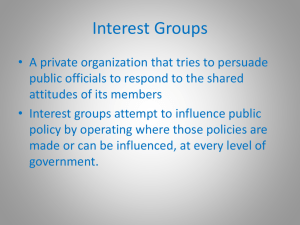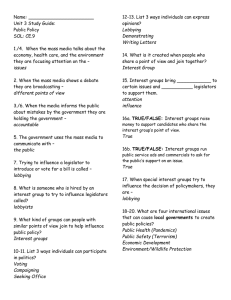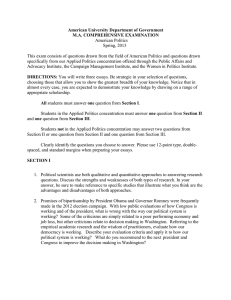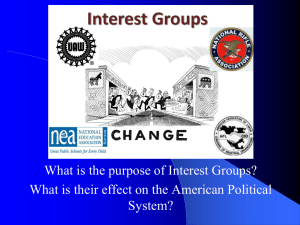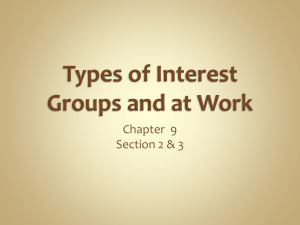Sarah Heidt April 18, 2011
advertisement
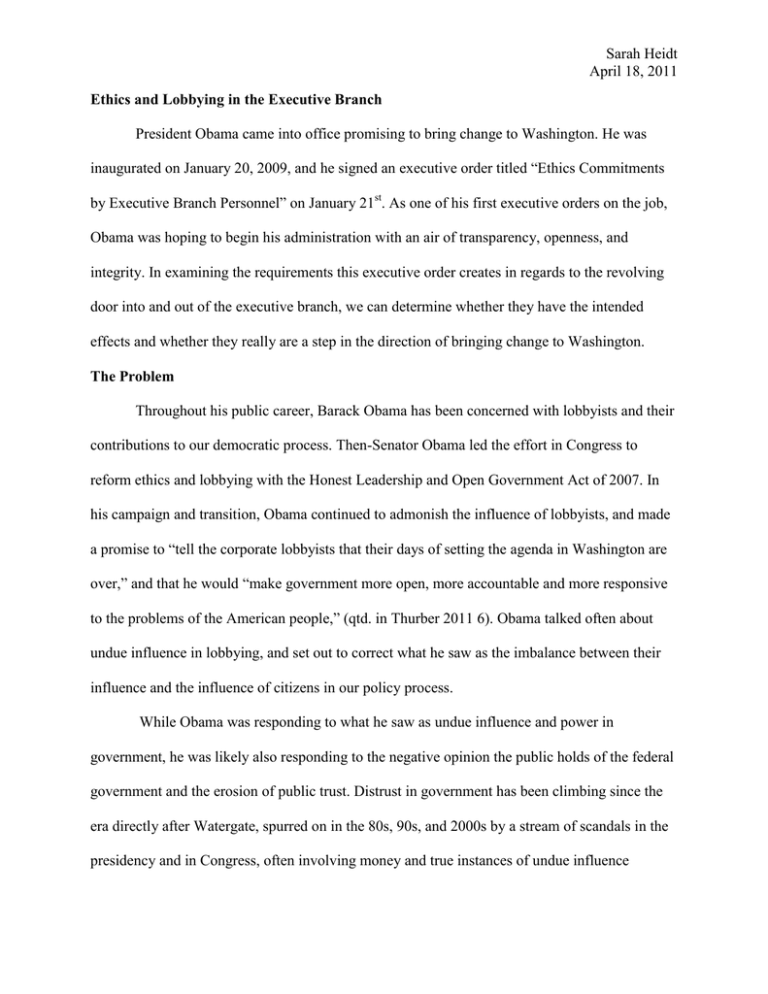
Sarah Heidt April 18, 2011 Ethics and Lobbying in the Executive Branch President Obama came into office promising to bring change to Washington. He was inaugurated on January 20, 2009, and he signed an executive order titled “Ethics Commitments by Executive Branch Personnel” on January 21st. As one of his first executive orders on the job, Obama was hoping to begin his administration with an air of transparency, openness, and integrity. In examining the requirements this executive order creates in regards to the revolving door into and out of the executive branch, we can determine whether they have the intended effects and whether they really are a step in the direction of bringing change to Washington. The Problem Throughout his public career, Barack Obama has been concerned with lobbyists and their contributions to our democratic process. Then-Senator Obama led the effort in Congress to reform ethics and lobbying with the Honest Leadership and Open Government Act of 2007. In his campaign and transition, Obama continued to admonish the influence of lobbyists, and made a promise to “tell the corporate lobbyists that their days of setting the agenda in Washington are over,” and that he would “make government more open, more accountable and more responsive to the problems of the American people,” (qtd. in Thurber 2011 6). Obama talked often about undue influence in lobbying, and set out to correct what he saw as the imbalance between their influence and the influence of citizens in our policy process. While Obama was responding to what he saw as undue influence and power in government, he was likely also responding to the negative opinion the public holds of the federal government and the erosion of public trust. Distrust in government has been climbing since the era directly after Watergate, spurred on in the 80s, 90s, and 2000s by a stream of scandals in the presidency and in Congress, often involving money and true instances of undue influence Heidt 2 (Thurber 2). Survey’s done in 2006 and 2008 revealed that the American public was very concerned about lobbying and scandal; this was the most important issue in the 2006 election, and the third most important in 2008 (Thurber 2010). Studies also showed a high level of anger with Congress, related to the relationship Congress has with organized special interests, and the fact that the ethics committees were not investigating ethics concerns, as in the case with Jack Abramoff (Thurber 2010). In his reforms, Obama was attempting to address the problem of the erosion of public trust in government, by demonstrating his commitment to transparency and openness in the everyday affairs of the government and his administration in particular. Goals of Reform Obama’s executive order was intended to assure the American people that the executive branch would conduct its business with the best-interests of the American public in mind, and that it would not be unduly influenced by other interests. The goals of the executive order and specifically of its provisions that affect the revolving door were twofold. First, the goal was to close the revolving door between government and lobbying, to curb the influence lobbyists have in politics and policy in the executive branch. Obama held that the revolving door damaged our public debate, that it let special interests to control the discussion of issues and that lobbyists used the revolving door for personal gain (White House 2009). He intended to shut off the undue influence he saw lobbyists as having through his revolving door bans in the executive order. Second, while campaigning for the presidency, Obama had promised to keep lobbyists out of his administration and launch sweeping ethics reform in order to address the problem of the influence special interests have in our government (qtd. in Thurber 2011 6). In this sense, his executive order served as a way to fulfill a campaign promise and demonstrate his commitment to openness and transparency in government. Heidt 3 Program Established by Reform The executive order signed by Barack Obama focused on ethics in the executive branch broadly, not simply on the revolving door of lobbyists entering and leaving government service. It creates an ethics pledge that every appointee of the executive branch must sign before being allowed to begin work in the administration. The pledge includes restrictions on gifts from lobbyists, rules for the revolving door both into and out of government, and a commitment to hiring practices based on qualifications of applicants. The order includes provisions for administration and enforcement of the pledge, in coordinating with agency ethics officers and the Attorney General in providing advice about the restrictions in the pledge, and in initiating investigations and other legal steps in the case of a breach of the commitments of the pledge. As written in the executive order, the pledge has two provisions that specifically deal with the revolving door into government. Part 2 of the pledge says that for the two years after they are appointed, all appointees are not allowed to “participate in any particular matter involving specific parties” that involves matters related to a former employer or client. This includes things like regulations and contracts, which appointees are specifically banned from working on if they involve former employers or clients (Obama 1). With this part of the pledge, every appointee is restricted from working on things that involve those they have worked with prior to being appointed to the post, to ensure ethical practices in the day-to-day business of the executive branch. In conjunction with part 2, part 3 of the pledge relates specifically to appointees entering government who were registered as lobbyists within the two years prior to being appointed. It places limitations on the duties involved in their employment, in addition to the restrictions of part 2 which they must also abide by. For two years following their appointment, these former Heidt 4 lobbyists are banned from working on any issue they lobbied on in the two years prior to their appointment, from working in the issue areas those matters fall into, and from working for the agency they lobbied in those two years (Obama 1). In this way, Obama hopes to end any opportunity for lobbyists to have undue influence on policy by limiting the ability of lobbyists to work in areas in which they have an in-depth knowledge of policy as a result of having worked with it in the course of their lobbying career. While all appointees have to sign a pledge to honor these commitments, they must also agree to restrictions in the case that they decide to leave government service. Part 4 of the ethics pledge applies to all appointees leaving government, and states that they must agree to abide by the preexisting post-employment restrictions for two years after they leave their post, if those restrictions apply to them. Appointees who wish to leave government to lobby have to follow additional restrictions, as stated in part 5 of the pledge, namely that they agree not to lobby executive branch officials or appointees for the remainder of the Obama administration (Obama 1). The limitations of these parts of the pledge aim to ensure ethical behavior by eliminating the ability for previous staff members to have undue influence on their former co-workers once they leave the executive branch. To provide more clarity on the restrictions and their scope, the executive order also spells out definitions for the terms in the pledge that affect the revolving door. First, and perhaps most importantly, the order defines appointee in order to specify exactly who this pledge applies to. For the purposes of this executive order, appointee is defined in three separate categories: 1) any non-career presidential or vice presidential appointee; 2) any non-career appointee from the Senior Executive Service; and 3) appointees to any position that is not part of competitive hiring practices, for reasons of confidentiality or policy (Obama 2). This executive order does not apply Heidt 5 to career civil servants or bureaucrats. It also exempts any Senior Foreign Service appointees and those who serve as uniformed service commissioned officers (Obama 2). The executive order is tailored to target these individuals so as to specifically affect political appointees and to not impede hiring practices in the whole of the executive branch. Other definitions included in the executive order strive to make clear which activities are prohibited by the revolving door bans. The order defines “particular matter involving specific parties” to make it clear that when working in the executive branch, if in the course of official duties a matter comes up that would involve communication with former employers or clients, participation is not allowed unless it is a general matter where participation is open to everyone interested, like with meetings that are open to any staff members. Former employer is defined as anyone for whom the appointee has served as “an employee, officer, director, trustee, or general partner,” and former client includes persons for whom the appointee has personally provided services as an “agent, attorney, or consultant,” (Obama 3). These definitions are provided to give as much clarity as possible on the limitations introduced by the ethics pledge. These provisions and definitions set clear standards for political appointees in the executive branch, and in general tend to specifically restrict the behavior of lobbyists and what they are allowed to do in working for the executive branch. However, the executive order also includes a waiver in Section 3. This section allows for the OMB to waive any of the rules in the pledge for any appointee. There are two reasons that the OMB can use to grant these waivers: they may do so if “the literal application of the restriction is inconsistent with the purposes of the restriction,” or if “it is in the public interest to grant the waiver,” (Obama 4). In general, waivers may be granted if the restrictions place limitations that were not intended on appointees, or if Heidt 6 there are special circumstances or advice that would be of great benefit to the public interest in the position. Major Impacts of Reform In assessing the impacts of most measures, we begin by looking at whether the measure met the intended goals, and whether it was successful at solving the stated problem. In the case of Obama’s executive order and its provisions regarding the revolving door, the only real thing Obama can point to as a success is that he fulfilled a campaign promise to institute ethics reform in the executive branch. In all other ways, the reform has failed to address the stated problems, and has created some unfortunate consequences that should now be addressed. The executive order signed by Barack Obama has failed to ban lobbyists from being involved in his administration, mostly because he himself ignores its stated purposes. While he may not directly try to appoint many lobbyists to key posts in the White House (although he is able to do so simply by directing the OMB to grant a waiver), “individuals who do not meet the narrow statutory definition of “lobbyist” but are engaged in all methods of influencing policy decisions have heavily populated the Obama White House and departments,” (CRP 2010, qtd. in Thurber 2011 12). He uses lobbyists when he needs them, usually by just calling them by a different name, and he meets with lobbyists and representatives of special interests extensively, especially for his most important policy initiatives. In the case of health care reform, Obama relied on Tom Daschle for advice extensively. He was able to provide all the information Obama needed without being subject to regulations, despite the fact that he had been lobbying for the health insurance industry since leaving Congress (Elving 2010). This is just one prime example of Obama’s use of lobbyists in his administration; he also relied on the expertise of lobbyists during debates over banking policy, cap and trade, and many other issues he has explored in his Heidt 7 term. As we can easily see, the executive order has failed at keeping lobbyists and special interests from having influence in the executive branch, mostly because of Obama’s refusal to follow the spirit of his own statements and his executive order. Obama’s executive order has done nothing to enhance the image the public has of government. In April of 2010, the Pew Research Center produced a study on how the American public views its government, and the findings were just as negative as ever. According to their final report, views of government are lower than they have been in a while: “Just 22% say they can trust the government in Washington almost always or most of the time, among the lowest measures in half a century,” (Pew 2010). While the public generally is unhappy with the government, perhaps more telling are their feelings on elected officials. “When asked about a series of criticisms of elected officials in Washington – that they care only about their careers, are influenced by special interests, are unwilling to compromise, and are profligate and out-oftouch – large majorities (no fewer than 76%) agree with each of the statements,” (Pew 2010). Looking into the numbers more closely, the percentage of people who feel that elected officials are influenced by special interest money is 82%. Even more than a year after Obama instituted his ethics reforms, the people feel just as bad or worse about their government and the influence of special interests and money on elected officials. The reform then had no effect on curbing the influence lobbyists actually have on the political process, and did not enhance public trust in government. So, what does the executive order actually do? Was it merely a political tool employed by President Obama? From his use of lobbyists in his administration and in crafting policy initiatives, and from the fact that he has to be reminded to play by his own rules in his reliance on advice from advocates like Daschle, it is pretty easy to see that Obama probably does not see lobbying as an evil that needs to be Heidt 8 eradicated, as some of his statements seem to suggest. However, bashing lobbyists and creating restrictions on them is a politically palatable move that he can use to advance his own standing with the public. As suggested by Nicholas Allard, a partner at Patton Boggs, LLP, “the problem with Obama’s restrictions are that they don’t have anything to do with the legitimate concerns of undue influence and corruption. They have to do with holding those who disagree with you at bay,” (Allard 2011). There is much evidence, some cited above, that Obama frequently turns to lobbyists without calling them by name. Therefore anyone he needs is a stakeholder or an expert, and anyone on the other side is a special interest lobbyist. In creating this distinction, Obama seeks to use lobbyists both for policy development and for political capital. Both practically and politically, there are many unintended consequences of such a development. The first is that the executive order, combined with many other recent reforms, has caused a slew of deregistrations of lobbyists. Because of the restrictions on lobbyists in working for the executive branch, and because of the denigration of the profession of lobbying, lobbyists are now incentivized even further to find loopholes or weaknesses in the laws, and thousands of formerly registered lobbyists have ended their registrations as a result (Sandler 2011). This is a direct contradiction of the claims that reforms will lead to more transparency, as it becomes more difficult to fully understand and calculate the impact of the lobbying industry in Washington as so many engage in lobbying activity without registering or reporting. A second immense consequence of the executive order and its revolving door provisions is that turning away lobbyists and limiting what they are able to work on turns away experience and expertise at a time when it is sorely needed to help address the problems we face. One of the main benefits of hiring former lobbyists or those who have worked at lobbying firms in the past is that they often are the ones who have the requisite expertise about policy. This is especially an Heidt 9 issue with banning lobbyists from sitting on federal advisory committees, where the whole point of the committee was to get advice from industry professionals (Sandler 2011). These new restrictions have hindered the Obama administration’s ability to fill key positions by eliminating highly qualified applicants from consideration simply because of their previous career as a lobbyist (Sloan 2011). In this way, the executive order it actively prevents Obama from having access to those with the experience and expertise to inform his policy initiatives. None of these consequences are as big as the one the lobbying community has been fighting for years; bashing lobbyists warps the public understanding of the political process and denigrates an honorable sector of public servants, and President Obama’s actions and words are making this distortion worse without addressing any real issues. Public knowledge of the policy process is relatively basic, and as such, the American people do not understand the role of lobbyists in our system. As the American League of Lobbyists charges, this lack of knowledge “makes us an easy target and a good sound byte, so some candidates are using our profession as a tool to further their campaigns,” (Lobbyists 1). Obama used this tactic in his campaign for the presidency, and has resorted to it time and again since entering office. He is feeding the fire of discontent with government at the worse possible time; as Allard says, “for the kind of enormous problems we have, the problem with bashing lobbyists… is that you breed distrust in government at a time when you need to focus on trust in the process to take the big issues on. We have so many legitimate points of view on the big issues. The way you get to an endpoint is by building a consensus on how to accommodate all the competing interests,” (Allard 2011). With his executive order and his continued attacks on lobbyists and the lobbying profession, President Obama has shown that he is not as interested in building consensus as he is in fueling political Heidt 10 fires and further destroying the reputation of dedicated individuals to advance his own political image. Conclusions President Obama’s executive order on ethics and its restrictions on the revolving door were ill-conceived and are a perpetuation of a misconception about how policy is formed and what role lobbyists play in our system. Its stated goals, to close the revolving door to limit the influence of lobbyists in the executive branch and to enhance public trust in government, were not met, perhaps as a consequence of not being the true objectives of the order. The unintended consequences of the order are vast and represent a step backwards for transparency and openness in government, and as such the order has little to no support in the lobbying community and with those who follow the development of standards of ethical conduct in government. Despite the failure of this particular policy, we should recognize that trust in government and views on the lobbying profession are exceedingly low, which has negative consequences of its own in terms of how government is seen and understood by its constituents. We need to find sincere and fair ways to address this problem. Perhaps a logical place to begin is to work to have more honest communication about the profession of lobbying in the course of our political process. We should strive to communicate better to the American people that “public policy advocacy is necessary, difficult work performed by law-abiding, highly skilled professionals who help government arrive at better-informed, and hopefully better, decisions,” (Allard 66). With an accurate assessment of the profession of lobbying and honesty about the source of ethical gaps in our policy process, we can work together to find true reforms that seek to improve the way our policy process operates today. Heidt 11 Works Cited Allard, Nicholas. “Lobbying is an Honorable Profession: The Right to Petition and the Competition to be Right.” Stanford Law and Policy Review, v. 19. 2008. Allard, Nicholas. Lobbying is an Honorable Profession. The Bryce Harlow Workshop on Ethics and Lobbying, American University. 19 March 2011. Guest Lecture. Elving, Ron. The Press and Public Advocacy: Media Coverage of Lobbying. Public Affairs and Advocacy Institute, American University. 31 December 2010. Guest Lecture. “Lobbyists Take Exception to Recent Statements by Presidential Candidates Concerning the Lobbying Profession.” PR Newswire. 31 January 2008. Obama, Barack. “Executive Order – Ethics Commitments by Executive Branch Personnel.” 21 January 2009. Pew Research Center for the People and the Press. “Distrust, Discontent, Anger and Partisan Rancor: The People and Their Government.” 18 April 2010. Sandler, Joseph. Discussion of ABA Task Force on Federal Lobbying Laws Report: Lobbying Law in the Spotlight: Challenges and Proposed Reforms. The Bryce Harlow Workshop on Ethics and Lobbying, American University. 26 March 2011. Guest Lecture. Sloan, Melanie. Intended and Unintended Consequences of Lobbying and Ethics. The Bryce Harlow Workshop on Ethics and Lobbying, American University. 19 March 2011. Guest Lecture. Thurber, James A. The Causes, Characteristics, and Consequences of Lobbying Reform. Public Affairs and Advocacy Institute, American University. 29 December 2010. Lecture. Thurber, James A. “Changing the Way Washington Works? Assessing President Obama’s Battle with Lobbyists.” Presidential Studies Quarterly. 2011. Heidt 12 The White House Office of the Press Secretary. “Statement from the Press Secretary on the President’s signing of two Executive Orders and three Memoranda.” 21 January 2009.


